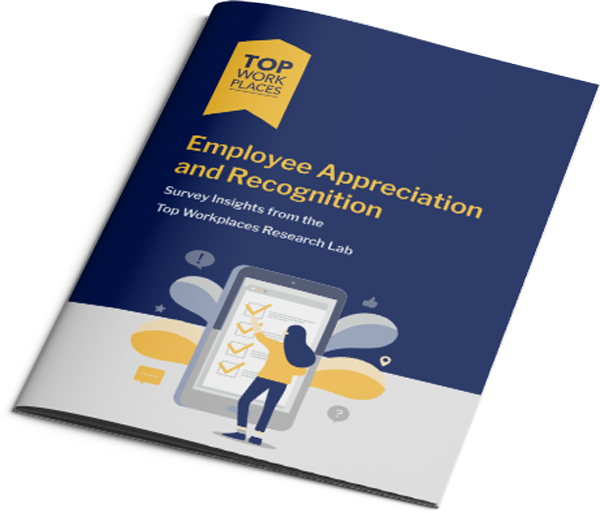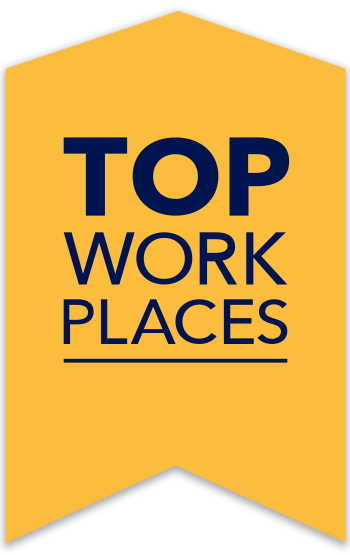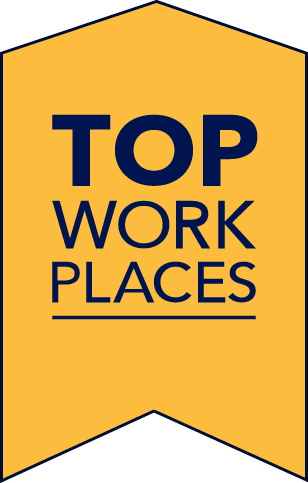
Create an appreciation culture with insights from HR professionals, Top Workplaces experts, and research-backed best practices.
There are many benefits of employee recognition in the workplace. Employee recognition boosts morale and motivation, which are crucial for employee engagement. More appreciation is always better, and consistency is critical to motivating employees.
Companies with the best employee recognition programs tailor their efforts to the individual. Employee recognition programs should evolve with company and employee needs, including the new world of remote work. CEOs and HR leaders say the recent shift to remote work makes it even more difficult to recognize people and, in turn, keep remote employees engaged.
What is employee recognition?
Employee recognition, also called social recognition or rewards and recognition, is about communicating appreciation for employee contributions to the workplace. When employees perform well and develop their skills, acknowledging hard work motivates them to learn even more.
Especially in today’s competitive work environment, leaders must understand the importance of awards and recognition. Employee recognition benefits include making employees feel connected, motivated, and proud.
And the best part? Recognition programs don’t have to be complicated or expensive. They require effort and planning, but the benefits will outweigh any costs and make the company money by improving performance and reducing turnover costs!
Why is employee recognition important?
Employee recognition consistently ranks as one of the strongest drivers of engagement. It’s also one of the simplest and least expensive ways to impact morale and productivity.
The pandemic, great resignation, and the current state of the world have led to record-breaking burnout, disconnection, and low morale. Now more than ever, it’s a great time to show appreciation with awards and recognition. Here are some recent statistics:
- Lack of recognition is the #1 reason why employees quit. (Gallup)
- Sophisticated recognition programs are twelve times more likely to have strong business outcomes. (Deloitte)
- Employee recognition is the number one ask from employees right now, with 82 percent of people wanting more recognition. (Achievers)
- Ninety percent of people say recognition motivates them to try harder. (Achievers)
Benefits of employee recognition
There are many cultural and financial benefits to employee recognition in the workplace. Here, we go into more detail about the key benefits:
- Improve company culture.
- Reduce turnover and improve employee retention.
- Improve employee engagement.
- Boost employee productivity.
- Improve employee job satisfaction and morale.
- Improve recruitment and attract top talent.
- Increase employee loyalty.
- Better alignment with core values.
- Better customer experiences.
- Improve employee well-being and mental health.
- Improve perception of management and leadership.
- Win employer recognition awards.
1. Improve company culture
A key benefit of employee appreciation and recognition is improved company culture. When you improve company culture, you reduce the costs associated with negativity in the workplace, which add up to $3 billion yearly (Bureau of Labor Statistics).
2. Reduce turnover and improve employee retention
Hiring and training new employees is expensive and time-consuming, but you can improve employee retention and reduce turnover costs with employee recognition programs. Those costs will go down when people want to stick around, and companies can use that time to grow other programs like training and development.
3. Improve employee engagement
Engagement is the fast track to higher employee morale, performance, and company profitability. Consistent appreciation keeps everyone connected to their work and company goals. It’s also one of the best ways to improve engagement.
4. Boost employee productivity
Recognizing and celebrating people for their work is a great way to encourage them to do more. One of the many benefits of employee appreciation is higher productivity. Almost 70 percent of employees say they would work harder if they felt more appreciated.
5. Improve employee job satisfaction and morale
Another benefit of employee recognition in the workplace is improved satisfaction and morale. Effective recognition programs award people for their work and give them an easy way to send appreciation to their peers. This combination of giving and receiving compliments will boost everyone’s morale.
6. Improve recruitment and attract top talent
Cultures that value employee appreciation attract top talent, making recruitment more successful at a lower cost. Companies with high levels of employee appreciation get recognized, too, which helps improve employee retention and attract top talent. Job seekers notice appreciation and are likely to join companies awarded for their employee recognition efforts.
7. More loyal employees
In addition to increased engagement and productivity, one of the many benefits of employee appreciation in the workplace is higher loyalty. Employees who feel genuinely included in the company culture and appreciated for their contributions will want to stay and grow where they are.
8. Better alignment with core values
Recognition is a great way to connect employees with a company’s mission and values. Show appreciation when employees live company values encourages them and others to continue aligning with the company.
9. Better customer experiences
Ensuring every employee feels appreciated, engaged, and motivated by the company’s mission is crucial. Customers will have a positive experience and spend more money when those criteria are met. Companies can also create a better brand reputation through employee awards and recognition.
Learn more: The Importance of Reputation in Business
10. Improve employee well-being and mental health
Showing genuine appreciation and recognition boosts employee well-being and mental health. Recognition prevents employee burnout by promoting engagement, interpersonal communication, and productivity. Within the past few years, global anxiety and depression rates increased by 25% (WHO), so investing in employee well-being is more important than ever.
11. Improve perception of management and leadership
Another benefit of employee recognition programs is the improved perception of leadership and management. Good managers understand that showing their employees genuine appreciation strengthens team performance and interpersonal connections. Managers also value recognition. Their performance improves when they receive appreciation from their team.
12. Win employer recognition awards
Employee recognition awards can lead to coveted employer recognition awards. Employees who feel appreciated view the company positively and will respond more positively to employee feedback surveys. Those results turn into employer recognition awards, leading to company celebrations, industry recognition, and improved brand reputation. It’s a great way to promote your qualities of a good workplace and show other leaders the importance of employee recognition.
Types of employee recognition
There are many different forms of employee recognition, including:
- Structured recognition: Formal forms of employee recognition such as employee-of-the-month awards and year-end honors.
- Unstructured recognition: Informal peer-to-peer or social recognition is encouraged and modeled by leadership.
- Written appreciation: Handwritten notes are a meaningful way to show appreciation.
- Verbal appreciation: Formal or informal, a simple “thank you” or public recognition of a job well done goes a long way.
Examples of good employee recognition
People value different types of appreciation, so trying different types of employee recognition is essential. Here are some great examples:
- Years of service award
- Customer service award
- Employee-of-the-month award
- Employee appreciation events
- Employee recognition wall
- Weekly shoutouts
- Monetary awards
Learn more: The Best Employee Awards and Recognition Ideas
Creating a modern employee recognition program
If your employee recognition program is nonexistent or outdated, consider creating one tailored to current employee needs. Here are the steps to build an effective employee recognition program:
- Get leadership buy-in: Share the benefits of an employee recognition program and highlight how it can impact performance.
- Define success: Outline the desired outcomes of a successful employee recognition program.
- Find out what matters most: Knowing how employees want to be recognized is essential. If you don’t know, ask.
- Try a multi-faceted approach: Employee appreciation isn’t one-size-fits-all, so consider various forms of recognition.
- Build appreciation into your culture: Efforts to nurture a culture of appreciation are most successful coming from multiple sources and levels across the organization.
- Be consistent and genuine: Who and what you celebrate tells your employees a lot about your culture and the type of culture you want. When sincere appreciation is modeled every day from the top down, you’ll create a culture that people want to be a part of and contribute to in every way.
- Measure employee appreciation: An employee engagement survey such as the Workplace Survey measures if employees feel genuinely appreciated and provide them the opportunity to provide context through anonymous comments.
Common misconceptions about employee appreciation programs
Now that you understand the importance of awards and recognition, you’re on your way to implementing a successful program. But before you get started, consider these red flags and what to watch for:
- Showing the wrong form of appreciation: Remember, knowing how people prefer to be appreciated is essential. If you don’t know, it’s fair to ask.
- Believing that rarity adds value: More is better, and consistency is critical to motivating employees.
- Allowing appreciation to fall through the cracks: Showing appreciation, especially during tough times, boosts motivation and productivity.
- Recognition programs that feel fake: Employees know genuine appreciation when they see it and when it’s fair.
Be recognized as a Top Workplace for appreciation
Employee appreciation and recognition are the building blocks of employee engagement. And right now, engagement is more critical than ever to help with retention, morale, and motivation.
Which companies excel at employee recognition? Check out award-winning Top Workplaces for Appreciation.
If your company believes in the power of a people-first culture that prioritizes employee appreciation, get recognized for it! Top Workplaces is the nation’s leading employer recognition program, offering awards in 60+ regional markets plus national honors for culture and industry excellence. To participate, begin by nominating your organization here.

 Stand out with an award-winning
Stand out with an award-winning